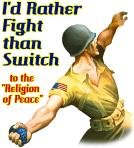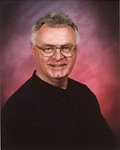 (Photo -- Clerics: From left, Omar Shahin, Marwan Saleddin and Mahmoud Sulaiman discuss the US Airways flight.)
(Photo -- Clerics: From left, Omar Shahin, Marwan Saleddin and Mahmoud Sulaiman discuss the US Airways flight.) From USA Today. I can't believe it.
Effort to name those who reported suspicious actions has chilling effect.
"If you see something, say something."
Since the terror attacks of 9/11, that common-sense message has been displayed prominently worldwide for obvious reasons.
Police and transportation authorities can't be everywhere. Whether at an airport, bus or rail station, officials need passengers to alert them to unattended baggage that might contain explosives and behavior that appears out of the ordinary.
Now the reward for being vigilant apparently includes being dragged into a lawsuit and accused of bigotry. The wry adage about how no good deed goes unpunished seems apt, though not so funny.
The lawsuit grew out of an incident last November when six Muslim clerics, returning from a religious conference in Minneapolis, were removed from a US Airways flight after passengers and crew raised alarms. The imams were questioned by authorities and released. The six say they are innocent victims of ethnic profiling for merely praying quietly in Arabic at the terminal.
Their lawsuit, filed earlier this month, accused the airline and Metropolitan Airports Commission of anti-Muslim bias. That was expected. What's unique and especially troubling, though, is the effort to identify an unknown number of passengers and airline employees who reported suspicions so they might also be included as defendants. For example, the imams want to know the names of an elderly couple who turned around "to watch" and then made cellphone calls, presumably to authorities, as the men prayed.
This legal tactic seems designed to intimidate passengers willing to do exactly what authorities have requested — say something about suspicious activity.
The imams' actions last November appeared to be either deliberately provocative or clueless as to how others might perceive them.
The imams' actions last November appeared to be either deliberately provocative or clueless as to how others might perceive them.
Several passengers and crewmembers told authorities that the men loudly chanted "Allah" several times, cursed U.S. involvement in Iraq and switched their seat assignments. Three imams asked for seat belt extenders, which include a heavy metal buckle that could be used as a weapon, but left them on the floor.
Under the circumstances, the pilot made a reasonable judgment call to remove them from the plane. Some of the facts are in dispute: The imams deny making any anti-American remarks and say seats were changed to accommodate a blind cleric who might need assistance. They accuse the airline of slandering them.
Under the circumstances, the pilot made a reasonable judgment call to remove them from the plane. Some of the facts are in dispute: The imams deny making any anti-American remarks and say seats were changed to accommodate a blind cleric who might need assistance. They accuse the airline of slandering them.
US Airways can afford to defend itself and the crew in court. Passengers who notified authorities don't have those resources. Several lawyers have promised to represent such passengers for free. The American Islamic Forum for Democracy, a moderate Muslim group, will raise funds for their defense. Rep. Steve Pearce, R-N.M., has introduced a bill to shield from legal liability those who report suspicious behavior.
It shouldn't have to come to that, especially if a judge has the wisdom to throw out the complaints against the "John Doe" passengers before they're identified.
As for ethnic profiling — the reprehensible practice of discriminating solely based on ethnicity — this incident doesn't qualify. The imams were tossed off the plane because of suspicious behavior, which obviously can't be ignored.
Suing passengers who merely report such behavior threatens everyone's ability to travel securely.














No comments:
Post a Comment